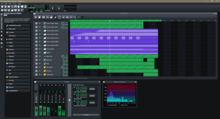LMMS
Appearance
 | |
 Screenshot of a project in LMMS 1.2.1 | |
| Original author(s) | Paul Giblock Tobias Junghans[1] |
|---|---|
| Developer(s) | LMMS developers |
| Initial release | 2004; as Linux MultiMedia Studio |
| Stable release | 1.2.2[2]
/ 4 July 2020; 9 November 2020 |
| Repository | |
| Written in | |
| Platform | x86 and x86-64 (Linux, macOS, Windows), only Linux: arm64, armel, armhf, mips, mips64el, mipsel, ppc64el, s390x[3] |
| Available in | 20 languages[4] |
| Type | Digital audio workstation |
| License | GPL-2.0-or-later[5] |
| Website | lmms |
LMMS (formerly Linux MultiMedia Studiotrackers and sequencers. It is free and open source software, written in Qt and released under GPL-2.0-or-later.
System requirements
LMMS is available for multiple
RAM and a two-channel sound card.[7]
Program features
LMMS accepts
GUS patches, and it supports the Linux Audio Developer's Simple Plugin API (LADSPA) and LV2 (only master branch, since 24.05.2020). It can use VST plug-ins on Win32, Win64, or Wine32. The nightly versions support LinuxVST. Currently the macOS port doesn't support them.[8][9]
It can import Musical Instrument Digital Interface (MIDI) and Hydrogen files and can read and write customized presets and themes.[10]
Audio can be exported in the Ogg, FLAC, MP3, and WAV file formats.[11]
Projects can be saved in the compressed MMPZ file format or the uncompressed MMP file format.[12]
Editors
- Song Editor – for arranging instruments, samples, groups of notes, automation, and more
- Beat+Bassline Editor – for quickly sequencing rhythms
- FX Mixer – for sending multiple audio inputs through groups of effects and sending them to other mixer channels, infinite channels are supported
- Piano Roll – edit patterns and melodies
- Automation Editor – move almost any knob or widget over the course of the song
-
Song Editor
-
Beat+Bassline Editor
-
FX mixer
-
Piano Roll
-
Automation Editor
Audio plug-ins
LMMS includes a variety of audio plug-ins that can be drag-and-dropped onto instrument tracks in the Song Editor and Beat+Bassline Editor.
Synthesizer plugins:
- BitInvader – wavetable-lookup synthesis
- FreeBoy – emulator of Game Boy audio processing unit (APU)
- Kicker – bass drum synthesizer
- LB302 – imitation of the Roland TB-303
- Mallets – tuneful percussion synthesizer
- Monstro – 3-oscillator synthesizer with modulation matrix
- Nescaline – NES-like synthesizer
- OpulenZ – 2-operator FM synthesizer
- Organic – organ-like synthesizer
- Sf2 Player – a Fluidsynth-based Soundfont player
- SID – emulator of the Commodore 64chips
- TripleOscillator - 3-oscillator synthesizer with 5 modulation modes: MIX,
- Vibed – vibrating string modeler
- Watsyn – 4-oscillator wavetable synthesizer
- Xpressive - mathematical expression parser synthesizer (only in alpha)
- ZynAddSubFX
Other plugins
- AudioFileProcessor (AFP) – basic sampler with trimming and looping capabilities
- SlicerT – slicer with tempo detection (only in nightly)
- VeSTige - interface for VST plugins
Standards
- Musical Instrument Digital Interface (MIDI)
- SoundFont (SF2)
- Virtual Studio Technology (VST)
- Linux Audio Developer's Simple Plugin API (LADSPA)
- LV2 (only master branch, since 24.05.2020)
- Gravis Ultrasound(GUS) patches (PatMan)
- JACK Audio Connection Kit (JACK)
- ZynAddSubFX
Audio output examples
See also
- List of music software
- List of Linux audio software
- Comparison of free software for audio
- Multitrack recording
- Comparison of multitrack recording software
References
- ^ "LMMS Alternatives and Similar Software - AlternativeTo.net". AlternativeTo.
- ^ "1.2.2 Latest". 4 July 2020. Retrieved 8 July 2023.
- ^ a b "Debian -- Details of package lmms in buster". Debian. Retrieved 24 November 2019.
- ^ "LMMS – Currently supported languages". GitHub. Retrieved 21 June 2017.
- ^ "LMMS License". lmms.io. Retrieved 2 June 2021.
- ^ "7.1 Glossary". LMMS User manual. 2020. Archived from the original on 18 June 2022. Retrieved 28 April 2023.
- ^ "Installation". LMMS • Documentation. 7 May 2024. Archived from the original on 29 April 2024. Retrieved 7 May 2024.
- ^ "VeSTige - LMMS Wiki". lmms.io.
- ^ "LMMS – Linux MultiMedia Studio". SourceForge. Retrieved 17 May 2011.
- ^ Dave Phillips (17 August 2009). "LMMS: The Linux MultiMedia Studio". Linux Journal. Retrieved 31 March 2016.
- ^ "LMMS Sound Editing Software". Software Insider. Retrieved 31 March 2011.[permanent dead link]
- ^ "lmms.io/utils.php function read_project". Github. Retrieved 3 August 2017.
- Tobias Doerffel (December 2005). "Making Music with Linux Multimedia Studio". Linux Magazine (61): 58–60. Retrieved 30 March 2009.
- Dave Phillips (1 October 2008). "State of the Art: Linux Audio 2008, Part II". Linux Journal. Archived from the original on 7 February 2009. Retrieved 30 March 2009.
External links
Wikimedia Commons has media related to LMMS.





